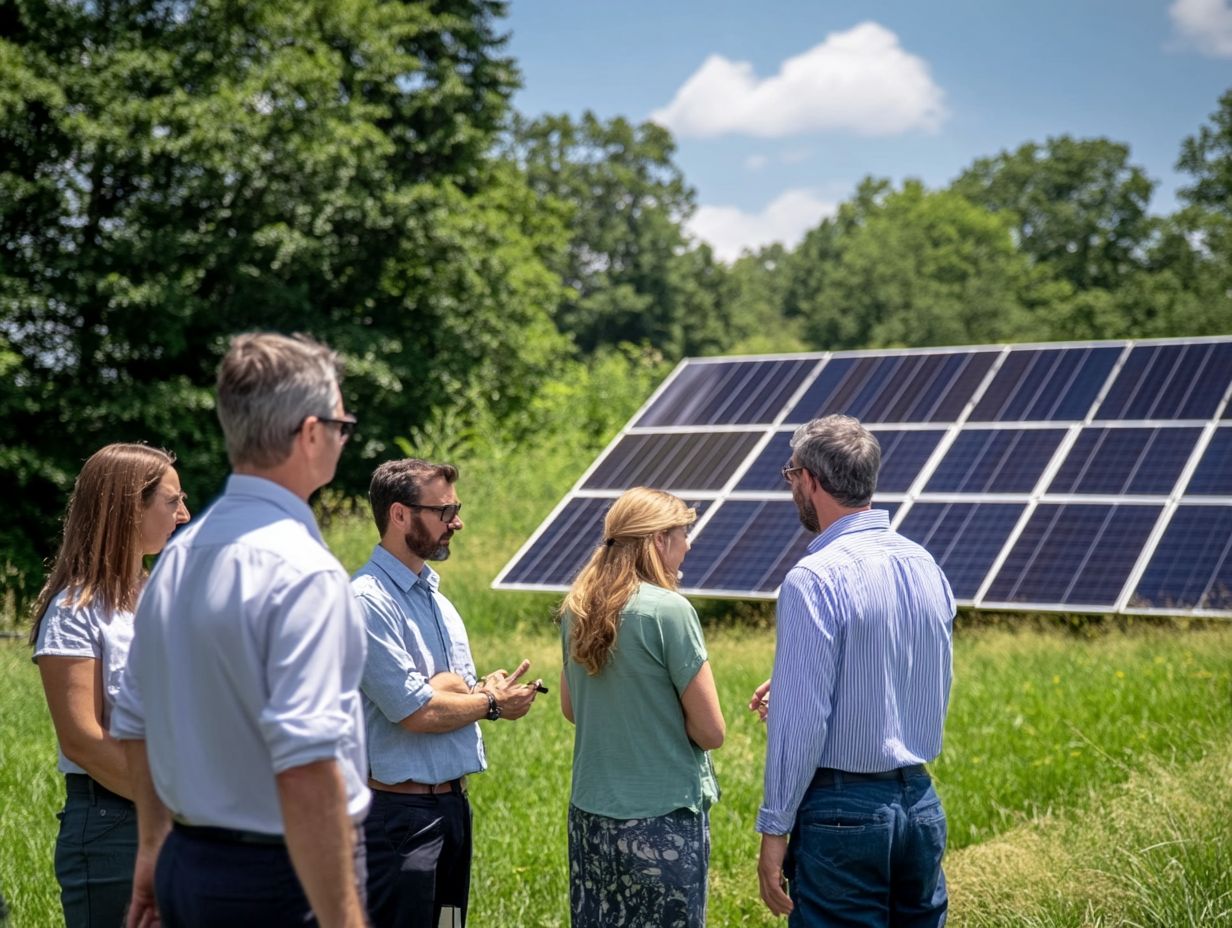Contents
- 1 Understanding Commercial Solar Energy
- 2 Key Benefits of Commercial Solar Energy
- 3 Government Incentives for Commercial Solar Energy
- 4 Eligibility Criteria for Government Solar Incentives
- 5 How to Take Advantage of Government Incentives
- 6 Maximizing the Benefits of Government Incentives
- 7 Frequently Asked Questions About Government Incentives for Commercial Solar
- 7.1 What are government incentives for commercial solar?
- 7.2 Who is eligible for government incentives for commercial solar?
- 7.3 What types of government incentives are available for commercial solar?
- 7.4 How do I apply for government incentives for commercial solar?
- 7.5 What are the benefits of utilizing government incentives for commercial solar?
- 7.6 Are there any deadlines for applying for government incentives for commercial solar?
As you look for sustainable solutions for your business, commercial solar energy really shines as a viable option that helps reduce your carbon footprint and boost your financial performance.
This article dives into the world of commercial solar, highlighting all the environmental and financial perks it offers.
You’ll discover the various government incentives available at the federal, state, and local levels, plus the eligibility requirements and steps to apply.
By getting a handle on how to make the most of these incentives, you can ramp up your energy savings while doing your part for a greener planet. Jump in to see how commercial solar can transform your approach to energy management!
Understanding Commercial Solar Energy

Commercial solar solutions play a crucial role in the energy transition, allowing you to harness renewable energy sources like solar power.
This not only boosts your sustainability efforts but also helps lower your energy costs. With the help of utility incentives and solar financing, businesses can readily adopt solar energy systems.
Thanks to advancements in solar technology and government programs, photovoltaic systems are now more efficient and accessible, making it easier for your business to reduce its carbon footprint and contribute to a cleaner environment.
These systems support energy diversification by providing sustainable energy solutions.
By adopting solar energy, you can achieve energy independence and take advantage of various government incentives designed to promote clean energy initiatives.
Utilizing solar grants and solar energy tax benefits further enhances your energy savings and sustainability efforts.
Green, M. A., Dunlop, E. D., Hohl-Ebinger, J., Yoshita, M., Kopidakis, N., & Hao, X. (2020). Solar cell efficiency tables (version 56). Progress in Photovoltaics: Research and Applications, 28(7), 629-638. Link
Defining Commercial Solar Energy
Commercial solar is all about using solar energy systems, like photovoltaic panels, in your business to generate electricity and cut down on your reliance on traditional energy sources.
Incorporating solar panel installations can optimize energy production and maximize your energy return on investment.
These systems grab sunlight and turn it into electricity, which can really help lower your operational costs. Additionally, solar energy projects can be supported through financing options such as solar leasing and power purchase agreements.
You’ve got a few options when it comes to commercial solar systems, including:
- Rooftop installations
- Ground-mounted systems
- Solar carports
Each one offers the flexibility to fit different business environments. But it’s not just about saving money; jumping on the solar bandwagon also helps support a move towards cleaner energy generation.
This contributes to sustainability efforts and shrinks your carbon footprint, ultimately promoting energy innovation and green technology.
As more businesses catch on to these benefits, making the switch to solar not only drives economic growth but also boosts your corporate responsibility by promoting eco-friendly practices in your community.
Embracing renewable energy investments can also lead to job creation and sustainability achievements.
Key Benefits of Commercial Solar Energy
Embracing commercial solar can bring you a ton of benefits, from major environmental perks to substantial financial savings that can really boost your business’s bottom line while promoting sustainability.
The integration of solar capacity and energy efficiency measures can further enhance your energy savings.
By tapping into solar energy, you can lower your energy costs, contribute to job creation in the renewable sector, and improve your overall energy efficiency.
Engagement in solar energy projects supports energy resilience and the achievement of energy-related tax deductions.
Plus, adopting solar power helps you align with corporate social responsibility goals, making it a smart and attractive choice for today’s businesses.
Implementing solar resource assessments can also aid in optimizing solar energy solutions.
Comprehensive Environmental and Financial Benefits of Commercial Solar
The extensive environmental and financial advantages of commercial solar energy are significant. By adopting clean technology, you can cut down on your carbon footprint and lower your energy costs.
Engaging in renewable portfolio standards and solar economic incentives accelerates clean power generation.
When you harness the power of solar energy, you’re not just helping to reduce greenhouse gas emissions; you’re also boosting your energy efficiency, which can lead to significant savings on operational costs.
This shift can provide you with a compelling return on investment (ROI) over time, setting you up for some serious long-term savings. Performance-based incentives further enhance your energy efficiency achievements.
As you implement these sustainable practices, you’ll enhance your reputation and align with corporate responsibility goals, which can help build stronger consumer trust and loyalty.
In addition, energy audits can identify further opportunities for commercial energy efficiency improvements.
By investing in solar solutions, you’re creating a win-win situation: protecting the planet while also strengthening your financial health and staying competitive in the market.
Engaging in solar development and technology adoption fosters sustainable development and enhances your energy systems.
Government Incentives for Commercial Solar Energy
Government incentives are key to making commercial solar more accessible and financially appealing for you.
These include solar rebates, solar energy funding, and tax benefits for businesses, which significantly enhance the financial viability of solar installations.
Thanks to various federal and state programs, you can take advantage of tax credits, solar grants, and rebates that are specifically created to promote solar installation and clean energy adoption.
State solar incentives complement these federal solar incentives for comprehensive support.
These financial incentives not only help you lower your initial investment costs but also boost the growth of the solar market.
This means more businesses, like yours, can jump on board and contribute to the energy transition toward sustainability.
Solar energy awareness and public-private partnerships play a pivotal role in this transition.
Federal Solar Incentives

Federal incentives for commercial solar include some pretty valuable programs, like the Investment Tax Credit (ITC) and the Production Tax Credit (PTC), which offer significant tax benefits for businesses diving into renewable energy.
Supporting energy innovation, these incentives help advance solar energy investment.
With the ITC, you can deduct a percentage of your solar installation costs from your federal taxes, which directly lowers your tax bill. Right now, businesses can take advantage of a 26% deduction for solar systems installed before the end of 2022.
Just a heads up, that drops to 22% after that, so it’s a good idea to act fast if you’re planning to invest early. Federal solar incentives like these enhance commercial property energy efficiency.
Then there’s the PTC, which rewards you based on how much energy your solar systems produce, giving you a nice boost if you’re generating a lot of power.
To really make the most of these benefits, you should take a good look at your energy needs and installation capabilities.
Conducting solar market growth analysis will aid in optimizing energy generation.
It might be worth consulting with tax professionals to help you figure out potential savings.
For example, if your company generates over 500 MWh from solar, you could snag some significant annual tax credits that greatly boost your return on investment.
Energy policy alignment ensures comprehensive financial benefits.
State and Local Incentives
Many states have their own incentives for commercial solar, like cash rebates, solar loans, and feed-in tariffs that can really boost the financial viability of your solar projects.
State energy offices provide crucial support for solar energy funding and energy production capabilities.
These state-level programs work hand in hand with federal initiatives, creating a solid environment for solar financing that helps slash those pesky upfront costs for businesses.
For example, California’s Solar Initiative offers substantial rebates for installing commercial solar systems, while Massachusetts has a Solar Loan Program that provides low-interest loans to ease the financial burden on business owners.
These initiatives promote energy diversification and renewable energy investments.
These programs not only make solar energy more affordable for you but also stimulate local economies by encouraging job creation in the renewable energy sector.
By taking advantage of both state and federal incentives, you can improve your return on investment and speed up your journey toward sustainable energy sources.
Engaging in solar industry initiatives further supports renewable energy certificates and energy compliance efforts.
Eligibility Criteria for Government Solar Incentives
Understanding the eligibility requirements for government incentives is key for you if you’re looking to invest in commercial solar and get the most financial benefits.
This includes considering solar development, energy audits, and energy conservation measures.
These steps not only benefit your company but also contribute to a larger societal impact.
Different federal and state programs have specific qualifications, such as the type of solar installation, project size, and any energy efficiency measures you have in place.
Awareness of solar capacity and energy transition strategies is essential.
By making sure you meet these requirements, you can unlock some serious savings and really capitalize on the growing solar market.
Understanding grid-connected solar and performance-based incentives will further optimize your solar investments.
Eligibility Requirements for Government Incentives
The requirements and qualifications for snagging government incentives can vary by program, so it’s important for you to get a grasp on things like project location, size, and energy performance before diving in.
Engaging with solar workforce development initiatives can enhance your compliance capabilities.
On top of these key factors, you’ll need to tackle a variety of paperwork and documentation, like detailed financial statements, eligibility checklists, and project plans.
These are crucial for getting your submission just right. Energy resilience strategies and solar arrays assessments are also recommended.
Navigating through all these requirements can feel like a maze, which is why it’s smart to connect with energy experts who can offer some solid guidance.
Engaging with solar energy policy professionals can streamline your efforts and enhance energy conservation practices.
These pros can help you streamline the application process and make sure you’re meeting all the necessary compliance regulations.
This way, you’ll significantly boost your chances of scoring those incentives meant to promote energy efficiency and sustainability.
Utilizing solar project financing opportunities strengthens energy generation and carbon credits acquisition.
Database of State Incentives for Renewables & Efficiency (DSIRE). (n.d.). DSIRE: Database of State Incentives for Renewables & Efficiency. Link
How to Take Advantage of Government Incentives
To really benefit from government incentives for commercial solar, you should follow a straightforward framework. Incorporating solar installation best practices ensures maximum energy savings and environmental benefits.
- Start by understanding the programs available to you, including both federal incentives and state programs.
- Prepare the necessary documentation, focusing on energy-related tax deductions and solar economic incentives.
- Make sure to apply on time to maximize your government funding opportunities.
By doing this, you can secure vital funding that can greatly reduce your solar installation costs and boost your energy savings. These steps will align with energy innovation and sustainable development objectives.
Steps to Apply for Incentives

Applying for government incentives involves a few key steps that you’ll want to keep in mind. First off, you need to research the programs available to you, including utility-scale solar and community solar initiatives.
Gather the necessary documents and submit a complete application to ensure you’re eligible for funding. Engaging in renewable energy certificates can further support energy transition efforts.
To begin, it’s essential to thoroughly investigate the specific incentives that match your needs, whether you’re looking at energy efficiency, business development, or social services.
Once you’ve identified the right programs, such as performance-based incentives and feed-in tariffs, make sure to carefully compile all the essential documents, like proof of income, tax forms, and project plans, to show you meet the eligibility criteria.
Solar capacity assessments will further refine your applications.
Having everything organized ahead of time can really make the process smoother. Ensuring compliance with environmental regulations and energy diversification requirements supports successful applications.
Don’t forget to double-check your application for any mistakes or missing pieces, as common issues include overlooked signatures or not meeting submission deadlines. It’s also a good idea to reach out to local offices for guidance; they can provide helpful insights and help you steer clear of unnecessary blunders.
Connecting with solar energy awareness programs enhances your credibility and application readiness. Accuracy in your application is paramount to ensure you secure the incentives available.
Maximizing the Benefits of Government Incentives
To get the most out of government incentives for commercial solar, you should take a strategic approach to your solar projects. Integrating net metering and solar industry best practices maximizes your financial and environmental benefits.
Actively seeking out additional financial incentives, including solar rebates and tax credits, that fit your business goals can really boost your benefits, especially in the context of renewable energy and solar power.
Maximizing Government Incentives: Essential Tips
To make the most of government incentives, including state programs and federal incentives, you might want to follow some key tips like doing thorough energy audits, exploring various solar financing options, and consulting with industry experts to optimize your financial planning and enhance energy efficiency.
Regularly tracking your energy consumption patterns can help you identify areas for improvement and potential cost savings.
Engaging with utility companies can also give you insights into available utility incentives and rebate programs that are tailored to specific industries.
Plus, networking with peers in similar sectors can reveal shared experiences, including solar leasing opportunities and innovative ways to take full advantage of these government programs and incentives.
Staying proactive about monitoring changes in legislation, energy policy, and incentive structures can help you adapt and seize new opportunities as they come up, ensuring your financial planning aligns with current benefits, energy transition strategies, and your future sustainability and clean energy goals.
Frequently Asked Questions About Government Incentives for Commercial Solar
What are government incentives for commercial solar?
Government incentives for commercial solar are financial or tax incentives offered by local, state, or federal governments to encourage businesses to invest in solar energy systems.
These incentives can include tax credits, solar grants, solar rebates, and other forms of financial assistance to promote energy independence and carbon footprint reduction.
Who is eligible for government incentives for commercial solar?

Eligibility for government incentives for commercial solar varies depending on the specific program and location. In general, most businesses that invest in solar energy projects are eligible for some form of incentive, including state solar incentives and business tax incentives.
It’s important to research and understand the specific requirements for each program, including potential solar energy tax benefits.
What types of government incentives are available for commercial solar?
Government incentives for commercial solar can include tax incentives, such as the investment tax credit, solar energy tax benefits, and accelerated depreciation, as well as solar grants, solar rebates, and performance-based incentives.
Some programs also offer financing options, such as power purchase agreements and solar project financing, for companies to install solar energy systems, enhancing energy savings and clean power generation.
How do I apply for government incentives for commercial solar?
The application process for government incentives for commercial solar varies depending on the specific program. Some programs require businesses to apply before the solar installation of photovoltaic systems, while others allow retroactive applications.
It’s important to research the specific requirements and deadlines for each program, including any necessary compliance with environmental regulations and energy conservation standards.
What are the benefits of utilizing government incentives for commercial solar?
There are many benefits to using government incentives for commercial solar, including lower upfront costs, reduced payback period, and increased energy return on investment.
These incentives can also help businesses reduce their carbon footprint, participate in grid-connected solar initiatives, and demonstrate their commitment to sustainability and green energy.
Are there any deadlines for applying for government incentives for commercial solar?
Deadlines for applying for government incentives for commercial solar vary depending on the specific program and location. Some programs have specific deadlines for applications, while others operate on a first-come, first-served basis.
It’s important to research and understand the deadlines for each program, including any requirements for renewable portfolio standards, to ensure timely and successful applications for maximizing energy generation and solar capacity.






